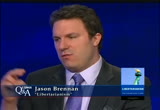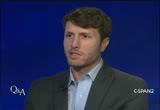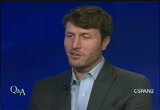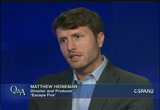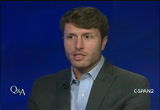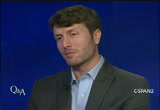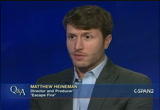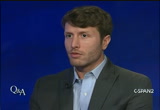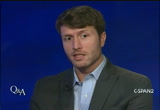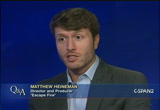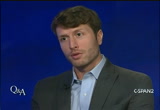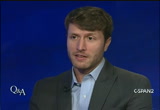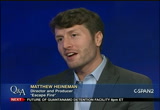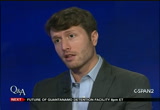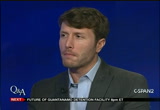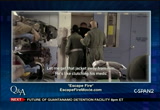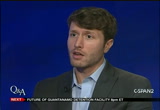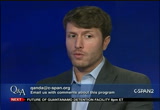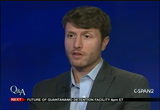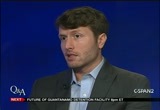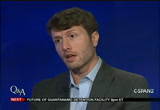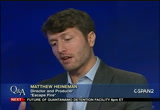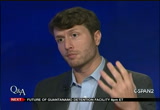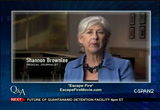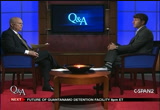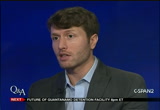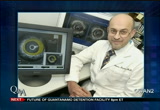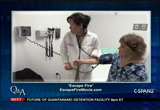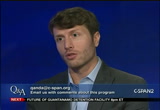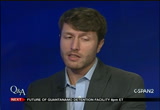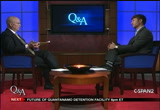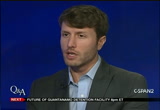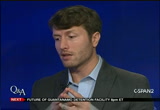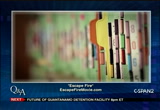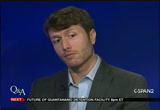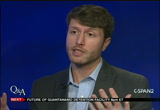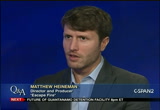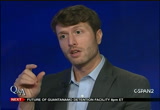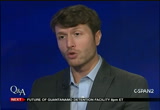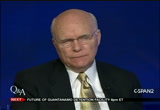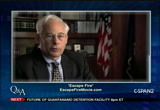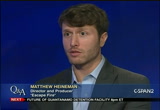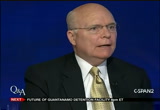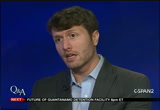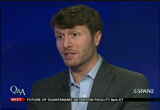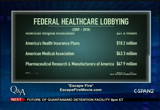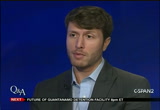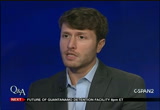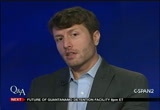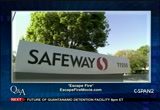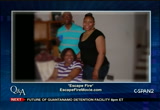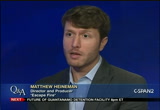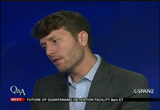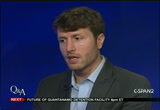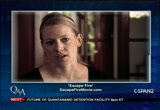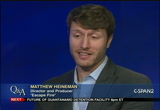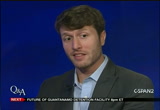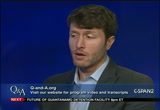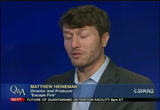tv Q A CSPAN January 11, 2013 7:00pm-8:00pm EST
7:00 pm
7:01 pm
titled "escape fire: the fight to rescue american healthcare." it's currently available in select theaters, on itunes and video on demand. c-span: matt heineman, one of the things that her bio sheet is you've developed a multimedia undertaking other young americans project. what was there? >> guest: thursday project called our time. i actually studied history in college. i do intention of being the filmmaker. i actually wanted to be a teacher and i got rejected from teacher erika inserted was sitting around trying to decide what to do and we had this plan to drive across the country for three months of interviewing kids from all walks of life to figure out what our generation is about to get sponsorship
7:02 pm
money, bought an rv and ended up driving around the country. that was my first film. i learned a ton about filmmaking , a ton about life and i fill them up with the process. with a blogger, you know, shot a film, church raided the. from that film, it led me to his job at hbo and started me down this crazy path of making documentary films. c-span: one question about teach for america. how big of an ego destroyer is that when they don't take you? how many young people try to become teach for america? >> guest: i couldn't believe it. i thought, i'm trying to help people and be a teacher and you get it, but it hurt. i wouldn't be sitting here if that hadn't happened. i ended up interviewing wendy kopp from teach for america for
7:03 pm
my first son, so it came full circle. c-span: go back to the project of going around the country. where did you go, how many people really do how much did it cost you? >> guest: in fall 2005 a data for three of of my best friends. it was really cheap. we were scrapping together money from family and friends. we get sponsorship money from nantucket nectar's and penske corp., but he was really bootstraps, rest guerrilla filmmaking. i'd never held a camera before, never taken a civil class before. it is just learning as we went. it is really an exhilarating experience. what an honor to go up to anyone across the country and get their story and speaks them about truth sendups of their lives. it was a meaningful experience. it was wonderful because we have this wide range of characters.
7:04 pm
have theater views are planned. mark from facebook to a drug dealer, to the cancer researcher, to homeless kids. c-span: what did you learn about young people? >> guest: i learned a lot. and learned that no matter where, is sort of cliché, but i matter where you're from, no matter what your background is, everyone has a burning desire to be better, do better, improve themselves. i want to wait for my trip because we went in without these preconceived notions that people in other generations are calling us apathetic and spoonfed and i walked to a feeling inspired our generation, you know, does want
7:05 pm
to fix this country, does want to fix this world. i don't know if it's going to happen overnight. i think our world is changing every day. the way we communicate, the way we effect change is going to be different than my father and grandmother grew up up in the 60s. we are not up there in the streets protesting. we communicate and spread information in a much different way. c-span: so where does you grew up? >> guest: i was born in d.c., grew up in connecticut, went to school in new hampshire. c-span: what this tapestry of your family? what do your parents do? >> guest: my mother is a journalist, a science writer. c-span: was her name heineman? >> guest: christine russell. she kept her maiden name. my dad, then heineman started out in the public sector and ended his career working for
7:06 pm
generally let trick and now teaches in boston. c-span: this is the well-known then heineman. was this other also well-known? explain not. this is the first deadline this review, but how do they fit into the past? >> guest: i had a very -- my parents and my grandmother are amazing people and i feel very lucky. c-span: what did they do? >> guest: my grandfather was a self-made man. his father actually killed himself in 1929 after the stock rocket crash and was left alone to fend for his family. went to school, claimed his plan to law school and started out as a lawyer and started running northwest railroad and a number of other businesses in chicago.
7:07 pm
with very specific advisor to president johnson and i think my dad and i inherited a lot of their social believes and i carry a lot of that into the filmmaking i do for sure. c-span: by the decided dartmouth to study history? >> guest: i didn't know what else to study. i didn't know what i want to do with my life. i didn't have a lot of direction. i played sports in college and i'd always been fascinated by history. i've been fascinated by the civil war, took a trip in high school to gettysburg and let history, so i decided to major in it and it really taught me to be analytical, to think critically about events. i try to learn from the past to affect the future.
7:08 pm
bright co. why film? what did you think film would do for you? didgeridoo film apartheid? >> guest: tape, video. c-span: y video? >> guest: i stumbled into it. i fell in love with the process and film has this amazing power to really tell stories in a way that touches audiences and touches people this early in a way that the written form can't do. i mean, you can really speak great social truths through the power of the documentary form. it such a malleable form. in this film, "escape fire," which i'm sure will talk about, we shot talking head interviews, list it on fire, had animation.
7:09 pm
it was really a hybrid form with all these different techniques that we used to really tell the story of our broken health care system. so it's a beautiful form and i love documentaries. c-span: will get to "escape fire" in just a second. go back to the first documentary. i was a documentary with the travel across the country? >> guest: we thought we were going to make a documentary and we shot 150 hours of footage. we didn't know what we were doing. we were filming, meeting people and following archived and came home three months later and said what the heck are we going to do with this? .final cut pro, a cheap editing program, read some books and started playing around with the footage. i ended up cutting together a short film. we renew our lens three months after katrina, saying it a a
7:10 pm
little short about the day we were there. i can, i kind of was amazed about how movie no place to do this and i just don't love the process. draco and then we ended up coming together a film. we at film festivals, kept getting good and kept getting people are saying this really brilliant, but i'm not sure if it is for a period eventually i got in the hands of an executive at hbo and he brought me in and said i'd love film. we love the film here. we don't want to buy it, we want to hire you to help reduce the alzheimer's project, which is a public health campaign they were doing. so is hired as one of their producers. c-span: you still have all the
7:11 pm
video you haven't used? >> guest: i continue to edit the film and found it to the documentary channel four is now available on amazon and hulu and other digital platforms. c-span: and the name? >> guest: our time. c-span: how did that go? on my home site is still there, on demand i believe. >> guest: you can still watch on demand. you can buy it on dvd, stream it online as well. again, i submitted my film, and ended up getting hired as a producer. c-span: whited hbo want to do this project? >> guest: hbo -- they are a wonderful channel because they
7:12 pm
produce a ton of content, but they are socially conscious and every couple years they produce large public health campaigns. they first did one on cancer, benediction. i worked on the alzheimer's project and is recently did a public health campaign on obesity. c-span: what did you learn? over the big things you learn from the alzheimer's project and how many different shows further? >> guest: these four different films. i was a producer on one of them called momentum and science, which is sort of where we are in the sign of alzheimer's. there is a film for children. as a film for caregivers. and i've learned a ton. i'd gone from working on my own in a closet in my apartment, editing my first film to working with oscar nominated emmy award
7:13 pm
winning filmmakers who became a mentor is. john hoffman, you know, the executive and producer of the project, who hired me has really been a mentor. he's a wonderful man has been very kind to me throughout my career. i also collaborated with susan domke. intimately we got along really well and ended up deciding to work on our latest on together. c-span: who is susan from key? >> guest: a multi-award-winning documentary filmmaker. her first film is greater and she's made over 30 films in her career. so it's really been a privilege -- is a privilege working at hbo with such talent and the resort of my film school. c-span: how close are you to your 30th birthday? >> guest: a year away from a 30 earth day.
7:14 pm
c-span: you've done all this in your 29? >> guest: yet. c-span: the recently asked a year besides his back on us because you're the documentary just-released event last month or so about whether? >> guest: the film is called "escape fire: the fight to rescue american healthcare" and it's really about how online our hope is system is broken. why does it want to change and people out there trying to change it. we started making the film in 2009 just as the health health e debate was heating up and there's so much fear and confusion around the topic. it was dividing our country, the topic of hope here. i think both susan and i really wanted to understand, you know, how the system came to be, why did this perverse system exists? we also wanted to find solutions and people out there chained to change it.
7:15 pm
so we didn't want to make it just a polemic. we wanted a film highlighted solutions well. c-span: let's jump into a cut. we have about 10 minutes every hour and 39 minute documentary that we will run during this discussion. let's jump and you can tell us the people we are seeing. >> i need some help over here. >> did he try to get up without anybody knowing? >> aegis ruled himself out. >> he's really not listening very well. we don't want them to fall again. now they put him on the other side. >> i'm going to find out what the guy. >> he's like clutching his head. >> he was issued this bottle
7:16 pm
today. he's taken 10 tablets. >> that is ridiculous. >> he could stop breathing if he took too much. c-span: where are you? >> guest: we are in a matter that flight from brownstein, germany to andrews air force base and we are really looking up the military is a microcosm for the rest of america and that they have the default alliance on pharmaceutical drugs. in america we spent $300 billion a year on drugs, it's almost as much as the rest of the combined. so we really wanted to try to explore this and we ended up deciding to explore it to the military. you cannot must not pick up the paper every day and not see something about overmedication or suicide in the military. so when we heard that the
7:17 pm
military is trying to fix this problem and that they were trying to do a study to see if acupuncture could work in lieu of drugs on this matter that flight, it just the sort of a homeless story we wanted to explore and it took us about a year to get access to get on that plane. with permission from the u.s. air force, u.s. army, took a long, long time. i was sweating while it's right before new year in 20 time. finally at the last minute we got permission to get on the plane and what received they are as we don't see that people are not steady. we ended up following a character called sergeant jesu is heavily, heavily
7:18 pm
overmedicated. what we see in the clip is what happens when we have a fragmented system, when we have a bunch of different doctors not looking out for a whole person. there's no way a human being should be on as many jokes as he was on that plane. he almost died. c-span: he holds up a bag full of containers of pills. >> guest: nurses and docs just couldn't figure out what he was fond, how many drugs he was on and his blood pressure dropped to a dangerous level, where he almost died. the whole plan was literally on shutdown. everyone was on high alert. c-span: that was in the air? >> guest: we were in the air across the atlantic. greenstein and germany to andrews air force base. searching gates, the young man we see in that clip has really handed it being the heart and
7:19 pm
soul of "escape fire," of our film. somebody we ended up following for about six months. c-span: did he agree before or after that you could use this? >> guest: he agree before. c-span: to be shy and something? >> guest: we basically got free rein with the military. obviously within reason, but for patients that we were following intimately, we needed a release from non-and the military needs a release as well. so he signed some paint before we got on a plane. c-span: did the military have any say to what you could use? >> guest: now. c-span: how many people on the plane? >> guest: way we work is really intimately, so as nonintrusive as possible. it was just myself, my cinematographer and may
7:20 pm
soundman, miller. i was filming a little bit as well. the key to the scene is not that would've worked. in many ways, that's the emotional crux of the film and where we really started getting to the belly of the beast of our system and see one of the most raw moments of our film. none of that would've happened if we hadn't been able to plug into the nurses had said studio to understand what is happening because it was so noisy and i you couldn't even hear yourself think or talk. c-span: where he sergeant robert gates today? >> guest: we ended up following him for many months as they said and he ended up entering himself into an innovative program at walter reid, with the ended up using acupuncture, meditation, using other techniques to wean him off
7:21 pm
the drugs he was on and through this program he was able to walk out at walter reid on his own two feet. so i really commend the military for two things. for one, allowing us to tell the story, both the good and the bad, but for recognizing this problem, by recognizing that there is this problem of overmedication and they are looking outside the box ideas on how to fix it. that's the whole thesis of the film, divided for a "escape fire" is the status quo is not working i would need to look outside the box ideas. reiko explained because we haven't seen it, what is escape fire? >> guest: short version or one version? >> guest: c-span: soupy blood and idea -- so people have an idea. >> guest: basically would have
7:22 pm
been with the force fire fighters were dropped dead to fight this fire. the latest and greatest technology filled this hubris. they called it a 10:00 fire. suddenly they found the wind shifted directions and found themselves running in the leader of the group that they match, bring the area around 10 so when the fire came and overtook him, he'd be safe in what is now known as an escape fire. he called for his men to join him, but nobody did. they kept running up a hill for dear life. they all died and he survived unharmed in this escape fire. it's a metaphor that our health care system is burning ember of burning at the show, sticking to the status quo were the answer is right in front of us.
7:23 pm
c-span: here's another couple of people we see a lot of in a documentary. the former journalist, sharon brownlee and doc to leslie choate. sharon bromley was with u.s. news at one point. why did you pick her as a spokesperson? >> guest: she had written a book called overtreated and not the wizard is seminal for us in understanding more is not better , that moore can hurt us. it was her book to explain that to eyes and therefore i sought her out to be in our film. c-span: here she is in others. >> the vast majority are paid by a fee-for-service system. that means they get paid for each office visit. if their surgeons, they get paid for each procedure. if it's a radiologist, they get
7:24 pm
paid for each ct scan they deliver. c-span: if i spent five minutes for you, you probably get paid $1500. for me to spend 45 minutes on an established visit with the patient to make sure they're doing exercise, making sure diabetes is okay and to figure out whether to problem says, probably get paid $15. it's a completely irrational system. >> fee-for-service rewards physicians for doing more. it does not reward them for doing a better job. it doesn't report them for keeping patients healthy. it rewards them for giving more care. c-span: what the doctors think of the fee-for-service? did you find out? >> guest: it is an antiquated, broken, perverse system that
7:25 pm
nobody is happy with, that is a predominately in which medicine is ran worst in our country. we pay for pieces that we get pieces. as they explain in the clip, we pay for individual procedures. we pay for prescribing drugs. each service that a doctor provide is paid for. when you pay forvize to d more. you're not incentivized to what's right for the patient. or incentivize to get my pills. so the problem with that is you don't really get to the bottom of what's wrong with somebody unnecessarily. you don't have time to spend 45 minutes to understand what's going on with their heart condition, whether there are other ways of changing the lifestyle or other aims. it's much easier to say who go
7:26 pm
into the lab and put a stent in. c-span: how did you get to the cleveland clinic you have in the documentary, how did you find you find asner? >> guest: we were reading "the new york times" and there's an article about a doctor outside of washington d.c. who is basically putting in way too many stands. this article explains overtreatment and not one of the doctors quoted was the head of cardiology at the cleveland clinic. so we gave him a call and asked him to be in our film and he agreed and it threw him that we learned more about the clinic as a model for health care. in speaking with them, one of
7:27 pm
dr. shows patience. c-span: here is here is more to continue that part of the story. >> how are you? >> i have great. >> she came to see me when she was at her with sand. she had had bypass surgery at an early age. 27 cardiac catheterization and well over 7 cents. this is just an unbelievable amount of students. >> i'm sorry, it's going to get pretty tight. >> i can't tell you how shocked we were when we saw her for the first time because he was a young woman whose diabetes is not well controlled or her cholesterol is well controlled in her high blood pressure is never well controlled. if some one had talked to her,
7:28 pm
someone would see her chest pain and shortness of breath. many of them would not have been necessary. >> 27 catheterizations? how often was that the case? >> guest: that's an extreme case, but not that extreme. so many people have students that don't meet them. in fact, 97% don't actually -- i'm helpful or useful. c-span: why do they do it? >> guest: because that is that they are to do. it's easier to put in a stints been spending time getting them to change their lifestyle by putting them in cardiac rehab. frankly apace why are. it paid $1500 or
7:29 pm
>> how often -- actually wanted to generate more money and take care of patients? >> guest: i'm not a senate. i don't think people going to messenger people, to make money off of people, though he set up a system that allows them to profit off of sickness. to profit off of doing procedures. if those are the incentives given, what are you going to do? snr film, two men with a hammer, everything looks like a nail that really holds true when it comes to the fee-for-service model that they're paid that way, taught that way. that's what they do.
7:30 pm
c-span: the woman, you can't osborne, what were your with her? >> guest: castine is incredibly important. we never like to film people and leave them on the cutting room floor as such is possible. when we filmed someone, were very judicious in finding who we want to film in speaking to them at length before hand. and so, it's a several week on process and finding her. reiko who is dr. leslie choate? >> guest: head of cardiology for the women's clinic at the cleveland clinic. c-span: she talks about the fact that she gets $15 to talk to someone for 45 minutes in $1500 to do you catheterization.
7:31 pm
>> guest: she sang a traditional medicine that's happened at the cleveland clinic it's a different model, where they are paid on salary. so she doesn't get paid anymore to do more. she doesn't get paid anymore to get more care. she gets paid a flat salary and incentivize to do a better job. c-span: i've never seen a case or is only $15 for a visit. >> guest: is how much the doctors themselves get paid. not the hospital. riker we've got another doctor you feature, a young woman with a small child, we search out the saw, aaron martin. very she? >> guest: shoes in hood river oregon. c-span: buddy to go to her? guests are dr. martin represented the frustration about this. we as americans, everyday americans who aren't in the medical field, most americans aren't happy with health care,
7:32 pm
but what i didn't really realize just how unhappy.bizarre. 50% without. 50% of doctors who get out of medicine if they could. it represents not only the frustration of doctors, but the frustration of primary care doc or is, which is really the basis of health care. we have a succession with the specialists. the specialists get paid more. doctors appointment device to going to specialty care and we have this primary care physician. primary care is the basis of health care. it's how we have preventive care, how we move from having a disease care system.
7:33 pm
c-span: she's in a community health care clinic. what was the situation there pays for that clinic? >> guest: that's the sort of government run clinic. they mostly get paid by the state enter medicare and medicaid. c-span: let's introduce everybody to dr. martin. >> instead of basing things on outcomes and how good of a job we are doing, it is the number of patients that we see. it doesn't matter how complicated they are. vicious number one, two, three, four, five. you have to play how much time and i'd like to send it down because the administration is telling you you need to seamer patience. simmons is what can we do to get your productivity up? i'm not interested in getting
7:34 pm
productivity up. i'm interested in helping patients. c-span: what happened here? >> guest: she'd come as you can see in this clip was not happy with where she lives. she was not happy with being forced to put band-aid fixes and much deeper problems. she was handcuffed by the system. she was for his to see so many patients, so she was so frustrated she ended up leaving. we followed her name on a sheet ekes out a different clinic that perhaps will allow her to succeed in a more meaningful way. c-span: window to oregon and videotaped her she was leaving not? for each end up?
7:35 pm
>> guest: she ended up going to a fellowship with dr. andrew weill, who is a big turkana of preventive medicine. what he has done this he thinks there's a gap gap in medical education that most medical schools only spent four hours on micturition. if you look at her disease, i don't know the exact number, but there's a huge percentage of heart disease based on nutrition and lifestyle choices. heart disease is the number one in america. i think what he's trying to do is basically bring some doctors out of the country of reteach agree teaches them anyway, a much more holistic look at the body, teaches them preventive medicine, nutrition and other things. these are not just primary care
7:36 pm
doctors. these are specialists as well. so she goes to the clinic. excuse me, goes to the fellowship program where she was reinvigorated by an end to find another clinic to process data. c-span: so when they see the very well-known book writer, lecturer and d. and r. nash and nice, who was going to say i now know where they're coming from? >> guest: i think a lot of people view dr. lyle and dr. ornish is french.there is, who advocate for alternative medicine. i think that is an unfair viewpoint. first of all you think they're both incredibly smart and passionate about fixing our health care system.
7:37 pm
they both strongly believe we need to move away from this disease care system to match mark preventive aids health care system. dr. weil himself is dedicating himself to education and through education he can change the culture of medicine. dr. ornish has used science to show that lifestyle can reverse heart disease. it's amazing what he's done recently. he's shown that telomeres, the ends of your chromosomes. and when you're stressed, telomeres get lessons. meat on it well, and exercise to get lessons. you're much more successful that when you increase your lifestyle, if you exercise more, if you eat right, if you
7:38 pm
destress, you can link to your telomeres and protect yourself against disease. c-span: this gentleman is somewhat known in this town because he was a recess appointment to run medicaid and medicare, to her per week. the republicans blocked him, that people would write the republicans liked him associate democrats. what led to your decision in your documentary? >> two things. i think he's one of the few people that can fix our system. the reason why we were that to happen is that he wrote an essay which was previously a speech he gave called escape fire. for a year and a half, it is
7:39 pm
called a tale of two systems, which is pretty much the most boring film title of all time and we would literally scratching our heads, feet couldn't figure out what to call. someone sent us this essay called "escape fire," in which we look at our brain health care system and a forest fire. when we read that, we knew what we wanted to call her film. we sought him out to be interviewed for the film. ultimately, ended up being a seasick character, coming in and out as one of her experts that we we to the film. c-span: once again the former u.s. news reporter and dr. berwick. let's watch. >> we spend a spectacular amounts of money on health care. $2.7 trillion per year.
7:40 pm
the average per capita cost of health care in the developed world is about $3000. in the united states, it was around $8000 annually. we spent one heck of a lot of money. >> health care system isn't affordable anymore. pacer that? this is all coming out of our pockets. it's your money. >> the really astonishing part about the fact we spend more as we have worse health outcomes. >> if you need complex cardiac surgery, you're lucky to be in this country. rescue kerry is second to none. as an overall system, were not anywhere near the best in the world. look at our results, our lifespan isn't even in the top 20. >> we have a disease care system
7:41 pm
and we have a very profitable disease care system. the disease care system, if it really was honest with itself, it doesn't want you to die and doesn't want you to get well. he just wants you to keep coming back for your care of your chronic disease. c-span: polls show that a lot of americans think what the best in the world. read the best best health care anywhere. they're happy with the health care system. who's going to be the most unhappy with this film? >> guest: people always ask us, who are the villains? c-span: i didn't ask you that. i want to know who you think will be unhappy and not point of view is just baloney. >> guest: i think the status quo will be unhappy with the film. the status quo was really powerful. andy lyle says there's rivers of money trencher very few pockets
7:42 pm
and the owners of the pockets don't want to see anything change in the owners the big insurers, pharmaceutical industries, and you know, they're making a lot of money off of this sick care system, disease care system we have and they don't want to see anything change. but what we see the clip is we spent twice as much if any other developed country in the world, but we are at or near the bottom on almost every measure propels care. into vitality, we are rethinking the 28th. literally, i never macek of health, we are at or near the bottom. clearly we are spending more, but getting way less than this has to change. c-span: one of those that was obviously invisibly critical of the insurance companies as a former insurance company executive by the name of wendell potter. who is he? >> guest: a former executive
7:43 pm
at sigma who visited a place called remote area medical. remote area medical was started by tv personality from britain. it would send airplanes into third world countries to provide health care. they realize there's places in the u.s. that once getting -- but equally needed that type of care. so he literally flies in these jumbo jets provides health care to fairgrounds, nascar crowns. and when wendell potter went to visit one of these missions, he saw thousands thousands of uninsured people who were standing in line to get health care and animal stalls and barns. he was denying people access to
7:44 pm
care. he was with insurance at the time? >> guest: he didn't realize he was doing. draco did he speak out before he left the company for after? >> guest: he stated the company a couple months and couldn't keep looking at himself in the merida cited to resign. c-span: hardisty make us money now? >> guest: he wrote a book about his experience and he speaks in lectures and writes. c-span: have the insurance companies done anything to stop them? >> guest: he doesn't like them called a whistleblower. he is not really whistleblower. evan is hard to stop and because he's a really grounded -- a lot of whistleblowers are extreme and polarizing. he's really well-liked by everyone. even people in the industry. so he doesn't have too many enemies. too many people don't like him,
7:45 pm
but he started unveiling something people sort of arty neo, the really speaking the truth about it. c-span: here is wendell potter. >> guest: there's the assumption that people who run governments are elected officials, members of congress. but it's not true in many cases. the power lies of corporate interests on this obvious. >> good morning folks, how are you? >> i was almost as surprised as anybody to see the reports i was the most frequent visitor to the white house during the health reform debate. it was important to keep expressing the hospital's position. >> it's an expensive world to live and in terms of getting your voice heard in d.c. but that's the whole that
7:46 pm
idiocy. >> how powerful our lobbyists and the health care system? infinitely. c-span: why did the head of the american hospital association talk to you? >> guest: they wanted to give their perspective that we wanted the above lobbyists. i don't think he's a bad guy at all. i think you just doing his job. his job is to advocate on behalf of hospitals and that's the way our system is set up. c-span: shannon brian laughed about the hospital thing. what did the health care industry get for that 1.1 brilliant? >> guest: the health care industry, specifically insurance got it though that didn't have a public option and was essentially giving them 30 million more customers.
7:47 pm
the real winners it got many more customers. many people don't think about it that way, but that's sort of what happened. c-span: how much money do you spend pharmaceuticals? >> guest: 300 billion. c-span: that 1.1 billion was small pharmaceuticals? >> guest: now, a number of different health care lobbyists. it's unclear exactly what the hospitals offering the bill. one of the things that is a beneficial thing coming out of the bill for sure is that there's many demonstration projects in which they are trying to examine forms of payment, were hospitals and instead of getting paid for fee-for-service, incited doing more, they are giving it up sum
7:48 pm
of money and saying you have to take care of these people and be more judicious in how you pay for them. so it's much more of an emphasis on quality versus quantity and remains to be seen whether that's going to work. c-span: you say you are not cynical, but he went through the whole alzheimer's discussion for hbo. i've been to this documentary on health care. if you watch her documentary, the pharmaceuticals get knocked. the government gets knocked by the fact that they determined, as we saw the doctors had seen so many patients today in order to make the money and all that. are we better off today than we were before the health care bill was passed? how did you come out of this? >> guest: you now, i think with our film would really try to be agnostic politically. so many of these documentaries,
7:49 pm
you sort of walk out of them feeling depressed and hopeless and we really did not want to make that type of film. from day one, we wanted a film that highlighted not just problems for solutions, but also that wasn't partisan, wasn't tied to a piece of legislation that essentially would allow a sane and menfolk complication. to bring all stakeholders to the table. c-span: here's the ceo said wei. why did you check him? >> guest: it was a model that both sides sort of lauded as how the private sector can be part of solution. c-span: let's watch steve bird. >> one company figured out how to lower health care costs by more than 40%. >> it's an idea with national
7:50 pm
attention. >> a safeway supermarket chain looked for a way to rename printemps and had to is a win-win solution. >> in 2005, with a billion health care bill granting that $100 billion a year. >> diabetics and prescriptions you can see how many scripts and the average script. >> what we discovered with 70% of health care costs are given by people's behaviors. >> and i had the affair was 200 pounds. i have made pizza, comics, dvds and that was the weekend. >> u.s. one day i haven't worked out, have been exercising to get busy and it's the last thing you really concerned about. >> i was chronically having
7:51 pm
colds and if there is a history of cancer and my family, diabetes, heart disease. i was a walking dead man. >> as a business guy that if we could influence behavior over 200,000 person workforce, we could have effects on health care costs. >> the easiest starting point was in the 30,000 nonunion workforce. i believe within four years, all of our employees get this health care plan. >> a billion dollars health care bill growing up in a hundred million dollars a year. it seems like you like you put through in this documentary, stop eating so much and exercise. >> guest: yeah, 75% of health care costs, three quarters of health care costs go to preventable diseases, some forms of cancer, diabetes, so we as a society need to figure out how to come more healthy. for me to incentivize people to do so, give them resources to do
7:52 pm
so. stop subsidizing the wrong foods. i mean, it's a multifactorial problem. americans are lazy people. i think what we see in the film and real experience on a daily lives, if we don't go to the doctor and get a pill to fix something i'm aware and happy. so one of the messages they really hope comes across in this film is that we do have this amazing power to heal, that we do have ownership over our own health. sure, some people have genetic predisposition and because of their socioeconomic status don't have the same resources, but within all of us, we have this capacity for healing. c-span: can you tell us how much this costs you to do? >> guest: the film? i don't know. i don't feel comfortable. c-span: who funded it? >> guest: we had one investor, but the majority came from
7:53 pm
grants, from foundations and individuals across the country who believed in what we were doing. c-span: how could somebody get this if they wanted? >> guest: we just released in theaters across the country. it's also available on itunes and video-on-demand. c-span: do you want to make money with this? >> guest: i think, no. of course i need money to live in pictures on the table and to get by, but first, the film is much more than just a film, just a commercial product. we hope the film can be used for social good and we seen that happen already. two weeks ago rescreened over 62 medical schools across the country, all in one night. i was at johns hopkins just north of here and just to see the energy for change. there's really this powerful movement out there that people
7:54 pm
want to change the system, that people want to fix this problem. a week later we screened at the pentagon, hosted by the u.s. surgeon general. she said this film is going to propel us how we practice health care in the military. that's powerful stuff. but i am most optimistic about if i don't know if we can weep for change to happen in washington. i don't know if we can weep for national change. but i must to mistake about this change happening at a local level, community by community, clinic to clinic. >> final clip for a discussion. dr. nissen from the cleveland clinic. >> the commercials on television, why do we need to wait? we can take a pill right now. >> when i watch the networks, half the answer for pharmaceutical agents.
7:55 pm
the >> it's not sure canada, united kingdom, france, germany. the only other countries new zealand. new zealand and united states or the other two countries to advertise prescription drugs. what does that do? it drives demand. the ads always end with the same phrase. ask your doctor. and people do. and doctors wanting to please patients who often prescribe it. c-span: do you know when they started, having pharmaceutical ads on television? >> guest: to be honest, i don't know. i think was in the 70s, but i'm not exactly sure. we are the only other country other than new zealand allowed to do this. c-span: why are we the only ones? and why new zealand? >> guest: that's a good question. why are we allowed to? of god, who knows. it's really restless leg syndrome. some of these agencies have
7:56 pm
created diseases that we otros around and people are making millions of dollars off and. c-span: did you look into why we see the stats on the evening news shows for the advertisement paid for your left arm i fall off, year-by-year microwave and they go on and on about what the side effects are. why do they have to do that? why do they do? >> guest: they are legally obligated to lessen side effects. it was a law passed to force them to list the side effects. we have a sequence in the film, listing all the side effects. your head will fall off, arm will fall off. your private parts will fall off. i mean, it's crazy that these things happen to people and for giving to people that have the side effects. in the film, we see the story of
7:57 pm
india, a judge used for diabetes and ended up killing between 50 and 200,000 people because the company really sat on the evidence and had to hack that this is causing heart attacks and a subset of patients. c-span: what is next for you? >> guest: i don't know. i don't have any plans for another film. and dedicated to getting this film out there. i believe in this message and i plan on traveling around the country with the film. right now or in the traditional release in theaters on demand in itunes, but i want to continue to take the films in two medical schools and businesses. we are planning on doing some what the va and i want to continue to work with the military, to really make sure this film can have an impact.
7:58 pm
c-span: for those who like documentary filmmaking, what is the big lesson you learned in doing this particular film that will never do again? >> guest: boy, i don't know if i'm ever going to take on such a big topic like this. i think one of the biggest hurdles for us was twofold. one, health care, health care when you scratch beneath the surface is a pretty boring, wonky subject. so we really from day one high to figure out how to make it interesting. it's also such a complex topic. president since teddy roosevelt had to fix this problem. so to make it digestible for audiences come it took us three and a half years to make the film. so i think what i find personally for myself and for my next film, i want to match driven, following one person or
7:59 pm
institution and have it not say a larger truth. c-span: just a rapper, born in d.c., grew up in connecticut, went to dartmouth, did a whole project traveling across the country. the name of the island is what again? >> guest: is called "our time." c-span: and the alzheimer's project in what you're? >> guest: of us are the producers and i came out in 2009. c-span: this documentary is called "escape fire: the fight to rescue american healthcare." our guest has been trained for and we thank you. >> guest: thank you so much. >> for a dvd copy of the program, call 1-877-662-7726. for free transcripts or to give comments about this program, visi a
175 Views
IN COLLECTIONS
CSPAN2 Television Archive
Television Archive  Television Archive News Search Service
Television Archive News Search Service 
Uploaded by TV Archive on

 Live Music Archive
Live Music Archive Librivox Free Audio
Librivox Free Audio Metropolitan Museum
Metropolitan Museum Cleveland Museum of Art
Cleveland Museum of Art Internet Arcade
Internet Arcade Console Living Room
Console Living Room Books to Borrow
Books to Borrow Open Library
Open Library TV News
TV News Understanding 9/11
Understanding 9/11